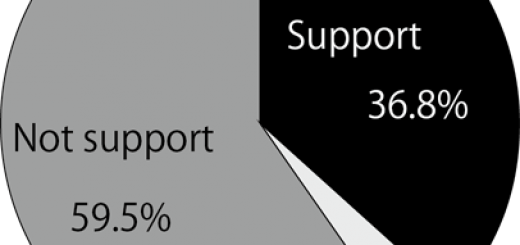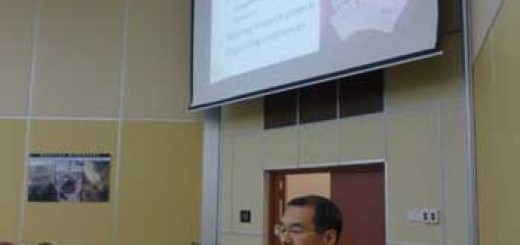NUMO President Displays Irresponsible Attitude at the 36th Meeting of the Radioactive Waste Working Group
By Takano Satoshi (CNIC)
The Ministry of Energy, Trade and Industry (METI) established an advisory body, the Radioactive Waste Working Group (RWWG), to administer policies for managing high-level radioactive waste (HLW). The 36th meeting of the RWWG was held on April 7, 2022. For many years, CNIC Co-Director Ban Hideyuki participated as a member of the RWWG, but as the WG has an age limit of 70 years, he had no option but to resign before the 36th meeting. I was therefore appointed to take his place as a member of the WG. As this was my first time to participate in the WG, I will point out here some of the problems of the RWWG.
Biased procedures favoring the administration
The 36th meeting was the first to be held since November 29, 2019, an interval of about two-and-a-half years. During that time, in October 2020, the Mayor of Suttsu Town, Hokkaido, coercively applied for a literature review related to an HLW disposal site while there were still local residents opposing the site.1 At the same time, Kamoenai Village, Hokkaido, also applied to the government for a literature review. The Nuclear Waste Management Organization of Japan (NUMO), which implements the literature review, began work on the review on November 18, simultaneously setting up a “forum for dialogue” to hear opinions from local residents. During this time, questions regarding the literature survey application, such as whether or not the opinions of local residents were fully summarized, and how a consensus was formed through exhaustive discussions in the forum for dialogue, should have been important topics for deliberation at the WG. The government, however, did not call a meeting of the WG until about 18 months after the literature review had begun. The actions of the government in firstly proceeding with the literature review and forum for dialogue to fit its own convenience and then ratifying the results as an afterthought shows extreme insincerity. This method of management of the WG, biased in favor of the administration, should be strongly condemned.
There are further problems with the management of the WG. In the WG, after the administration side explained how the literature review was coming along thus far, the members had three or four minutes to make comments. However, since there were a large number of issues that needed to be complained about, it is not possible to point all of them out in the roughly three minutes allowed. The administration side provides answers to the members’ comments and questions, but follow-up questions are not permitted. There is also no time to discuss issues that members have brought up with other members. With this WG design, it is not possible to hold substantive and full discussions. This exceptionally formalistic WG management acts as an excuse for the administration to explain that they have “sounded out the opinions of experts.” This point also requires improvement.
I also had doubts about the composition and quality of the members. Firstly, Japan’s current HLW management policy is premised on the promotion of geological disposal, but the total volume to be disposed of has not yet been confirmed. In 2012, the Science Council of Japan proposed a fundamental review of current policy and presented an alternative proposal that, having determined the total volume, the HLW should be stored in dry casks for the time being. I am also basically in favor of this alternative proposal. However, only one of the academics who wrote the report is a participating member of the WG. The WG has ten members, but those who hold views critical of the administration’s current policies consist of this academic, myself, and only one other person, which places us in a position of weakness. If the WG wishes to avoid the criticism that it simply exists to support administration bureaucrats, the government must appoint more individuals who are critical of the government’s policies.
This manner of WG management, biased in favor of the administration, is not something that is limited to this WG alone—this can be said to be a characteristic of Japanese advisory councils. To improve this situation, members must be given more substantial powers. For a start, it is crucial that members are given the right to call meetings when they think it is important to discuss a particular issue. This would make it possible to drive a wedge into the administration/government-led advisory council management methods.
In an effort to secure a diversity of opinions, the composition of members should include individuals recommended by incumbent and opposition parties as well as citizens’ organizations, not only those selected by the administration. I would like to point out that while the administration is primarily responsible for this problem of advisory councils, there are also issues with the way this is handled by citizens’ organizations. The structure of collusion between Japan’s politicians, business leaders and bureaucrats, the so-called iron triangle, is extremely robust, making for very few opportunities for the opinions of citizens’ organizations to be heard. Thus I believe that citizens’ organizations are taking the facile approach of “there are usually no opportunities to voice opinions directly to the government, so why not just join in the councils and say what you want to say?” when invited by the government to sit on one of the councils as a member. This just gives the government the excuse of saying that “we also listened to opposing views” and has the danger of providing very easy justification for policies. To avoid this, it is necessary to participate not as an individual, but to consciously make the effort to be able to represent the opinions of civil society. Although CNIC is one of Japan’s “representative” organizations working toward a nuclear phaseout, it would be presumptuous of us to therefore think of ourselves as “representing” the opinions of the nuclear phaseout side. To participate in this WG, I solicited opinions that should be presented to the WG from a number of activists who have been involved in the nuclear waste issue for many years. At the end of May, I am also scheduled to visit Suttsu Town to hear the opinions of residents who are opposed to the literature review.
Going forward, while strengthening the civil society network opposing nuclear waste, which is now rather weak, I aim to hold many discussions and summarize all the different opinions. By doing this I think my utterances in the WG will not simply be the opinions of one individual, but will take on the weight of being opinions that are to some extent representative of civil society. The recently deceased Prof. Shindo Muneyuki, who also had deep connections with CNIC, stated as follows in a book entitled “Expertise Distorted by Power,” critical of the nature of discussions in advisory councils:
The mission of people with expert knowledge should not be simply to act as an advisory body that responds to inquiries issued by the administration. Even though a person may be ostracized, clearly stating advice and views as a scientist on important issues may be said to be the duty of people with expert knowledge.
With these words engraved on my heart, I would like to go forward with my activities as a member of the WG.
The administration sticks to its irresponsible attitude
After that long introduction, I would now like to talk about the content of the actual WG discussions. Beginning by stating the conclusion, the discussions were of an extraordinarily low level. One item on the agenda was an assessment of the forum for dialog that NUMO is implementing. NUMO indicated the basic principles of guaranteeing fair and neutral management of the forum and not utilize it as a forum for consensus formation. I pointed out that the actual implementation was far removed from being an exercise of these principles. The very fact itself that NUMO, whose mission it is to promote geological disposal, is acting as the executive secretariat is making it difficult to exercise fair and neutral management. Further, I pointed out that as the design of the forum does not allow the opinions of experts who are opposed to geological disposal to be heard alongside NUMO’s views, the forum is almost solely for the purpose of explaining NUMO’s project. Since NUMO has abandoned the principles that it had itself indicated, I strongly requested that NUMO recognize that the forum for dialogue was a failure. The gist of NUMO’s President Kondo Shunsuke’s response was, “The forum is being managed at the initiative of the municipality,” “We are simply the servants who do whatever the municipality tells us to do,” and “As pretty talk, it is possible to have a democratic process, but actual society is not like that.” These words, which say that NUMO bears no responsibility for the management of the forum, since NUMO is a servant, are tantamount to an abandonment of administrative responsibility. The notion that if the municipality manages the forum in an undemocratic manner there is nothing that can be done to stop it tacitly recognizes that fact and is therefore extremely problematical. It may be that, in a sense, being able to elicit this irresponsible utterance was an achievement. However, NUMO is proceeding with the literature review without any condemnation of the NUMO president’s irresponsible attitude from the media or civil society. In an attempt to somehow put the brakes on this situation, on the one hand acting in solidarity with local residents as a social activist and on the other a member of the WG, I would like to go forward by directing stern criticism at the government and by presenting viable alternative proposals.
Footnote
- Japanese law stipulates that the selection of an HLW final disposal site must proceed according to the three stages: a literature review, an overall survey, and a detailed survey. The literature review, which consists of desk research based on literature and data, including geological maps and academic papers, is the first of these three stages. There are two types of application for the literature review, one in which the municipality concerned applies on its own initiative and one in which the municipality consents to an approach from the government.


